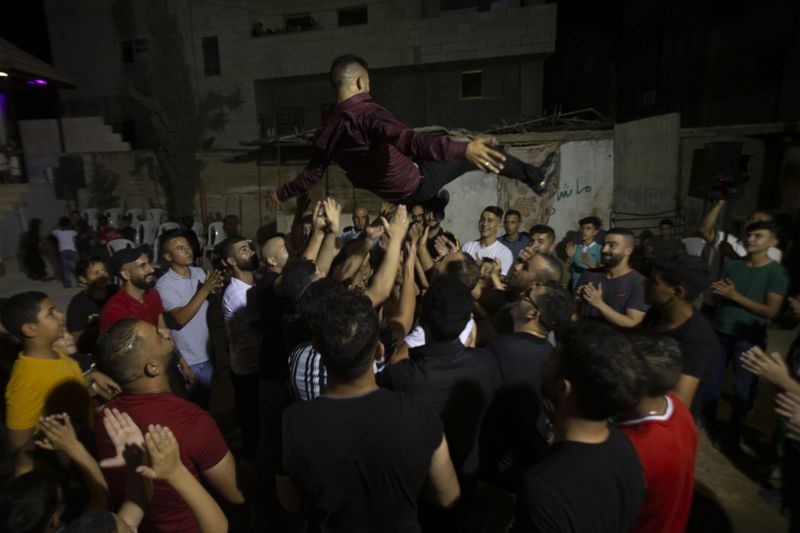
Dubai: The party was going strong: traditional music blared, families cheered, throngs of revellers danced. Then, police burst in. Officers kicked out guests, slapped hefty fines - even locked up the tuxedoed groom and singers.
In recent weeks, such unhappy endings to long-awaited weddings have become a common story in the Arab world, as resurgent coronavirus caseloads trigger tough police action.
See also
- News in pictures: Dhoni hails 'Dads Army', coronavirus herbal medicine, minor girl raped in India, US delays TikTok ban, Taj Mahal to reopen, who will succeed Ginsburg?, $13,000 COVID fine...
- COVID-19: Taj Mahal reopens even as India coronavirus cases soar
- COVID-19: UAE announces new protocols for weddings, funerals, social events
- COVID-19 sites in New York City before and after wave of coronavirus cases
Still, in a region where marriage is the cornerstone of society - the gateway to independence and the only culturally acceptable context for a sex life - couples are ploughing ahead, despite the deadly risks. Officials attribute a spike in virus cases to traditional, large-scale weddings that flout public health measures.
In Jenin, in the northern West Bank, Mustafa Khatib and six of his band members spent two nights in jail for serenading a crowded wedding party this month. Police fined the group $11,000.
“This is not fair,” said Khatib. “People will never stop getting married and will never stop holding parties.”
Mohammed Abu Al Naji, another singer, was released from detention only after pledging to stop singing until the pandemic ends.
“There were some 500 people at the party, with no protection whatsoever,” Al Naji recalled. “I wasn’t happy to be at such a wedding, but I had to,” to make ends meet, he said.

Palestinian authorities have shut down dozens of ceremonies, said police spokesman Loaie Irzekat. Yet the wave of fines, detentions and infections hasn’t stopped determined couples from getting hitched - surrounded by hundreds of their friends.
“You plan to have a small wedding but then all your relatives and friends show up,” explained Qasim Najjar, whose wedding party last weekend in the northern West Bank village of Deir Sharaf was dispersed by police. “This is our custom.”
For Arab families, large and lavish weddings mark social status. For newlyweds, the custom of accepting cash-filled envelopes helps them set up homes. For Palestinians, the ritual may run even deeper.
“It’s an existential thing,” said Randa Serhan, a political sociologist at the American University of Beirut, referring to Palestinians living under Israeli occupation or in exile. “If Palestinians stop marrying and procreating, they’ll cease to exist. They don’t have a nation, but they have family.”
The celebrations of life carry potentially fatal consequences. Palestinian Health Ministry official Ali Abed Rabu linked over 80 per cent of new coronavirus infections to large gatherings at weddings and funerals. Indoor wedding halls in conservative towns like Hebron have become vectors of contagion, he said. Coronavirus cases are now surging to new heights. The Palestinian National Authority has reported over 34,500 cases in the West Bank and 270 deaths.
In Israel, which is grappling with one of the world’s worst coronavirus outbreaks on a per capita basis, authorities point to large weddings in Arab towns as a leading cause of the virus’ spread. Along with ultra-Orthodox enclaves, known for large weddings and group prayers, Arab communities are among the hardest hit by the virus.
Arab-Israeli lawmaker Ahmad Tibi told The Associated Press that the infection rate in Arab areas has soared from roughly 3 per cent to 30 per cent during the summer wedding season. Israeli citizens, disillusioned after a failed first lockdown, are starting to “disregard government instructions,” he added.
When Egypt’s wedding halls shut down this spring as infections swelled, the wealthy moved their extravagant celebrations to private villas. Working-class Egyptians took their raucous parties to village streets, prompting local police to break up the festivities. But restrictions have relaxed as virus cases waned. Although Egyptian officials still warn of a possible “second wave,” the government announced last week that weddings could resume outdoors and in certified hotels.
In the UAE, daily infection rates reached a four-month peak. Dr. Farida Al Hosani, a health ministry spokeswoman, said close to 90 per cent of new cases stemmed from crowds at weddings, funerals and other events.
The UAE government has intensified its crackdown on illicit bashes. Last weekend, authorities ordered the detention of eight people across the country who had thrown massive, maskless parties.








